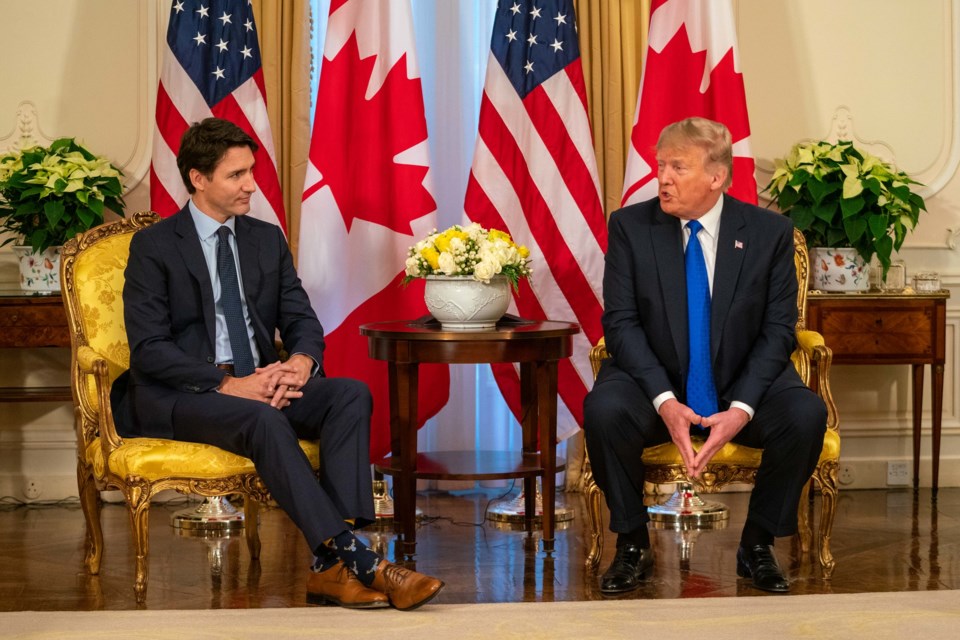Two days ago, U.S. President Donald Trump announced the implementation of a 25-per-cent tariff on imports from Canada, and 10 per cent on Canadian energy.
Sunday, when Research Co. asked Canadians for their early impressions, a whopping 87 per cent told us they have followed news related to this topic in the past seven days. For comparison purposes, significantly fewer Canadians were paying attention to in September 2023 (60 per cent), the in September 2024 (45 per cent) or the in July 2023 (41 per cent).
In the early stages of the trade dispute, heads of government appear to be connecting well with Canadians. More than half (54 per cent) approve of the performance of Prime Minister Justin Trudeau to deal with the tariffs implemented by the United States. Just over three in five (61 per cent) feel the same way about their provincial premier, with British Columbia leading the pack (67 per cent), followed by Ontario (64 per cent), Quebec (58 per cent) and Alberta (54 per cent).
Across the country, the approval rating on tariffs is lower for Official Opposition Leader Pierre Poilievre (47 per cent). His provincial counterparts are ranked lower (43 per cent), with a better showing in Ontario (47 per cent) than in Alberta and Quebec (44 per cent each), and British Columbia (37 per cent).
While the early read would suggest Poilievre has whiffed at bat, Canadians are not convinced that the incumbent federal party will be the best at managing Trump. Almost half of Canadians (49 per cent) think a Conservative federal government would be better positioned at this point to deal with the tariffs. This represents a three-point increase for Poilievre since a similar question we asked . Still, the generational differences are eye-catching. Belief that this file would be better administered if Poilievre were already in power is highest with Canadians aged 18-34 (61 per cent) but drops among those aged 35-54 (51 per cent) and those aged 55 and over (37 per cent).
Canadians are split when asked to look six months down the road. While 41 per cent expect the recently implemented tariffs on Canadian products to be rescinded by the Americans, 34 per cent foresee the tariffs being expanded. British Columbians are particularly pessimistic, with 44 per cent foreseeing the worst. Fewer residents of Quebec (32 per cent), Ontario (30 per cent) and Alberta (28 per cent) concur.
The brutal nature of Trump’s announcement also allows for an early review of options and actions. Almost two-thirds of Canadians (64 per cent) believe it is time to request an independent dispute settlement panel under the terms of the United States–Mexico–Canada Agreement (USMCA). Support is higher for enhancing trade with Mexico (75 per cent), Japan (also 75 per cent), the European Union (77 per cent), and Australia and New Zealand (78 per cent).
For years, we have asked Canadians if their province would be better off joining the United States. In , just over one in four (26 per cent) agreed with the statement, with the numbers trending higher in Alberta (30 per cent).
This time around, we asked about initiating a formal process for Canada to become an American state. More than seven in ten Canadians (71 per cent) disagree with this idea, but more than one in five (22 per cent) think it is something that should be considered.
As was the case in December, Canadians aged 18-34 are more likely to ponder a future as American citizens (35 per cent). The proportions are higher in Ontario and Quebec (27 per cent and 25 per cent, respectively) than in Alberta and British Columbia (19 per cent and 18 per cent, respectively). Those who claim on social media that “nobody” wants to join the United States are as misguided as the ones who believe “everybody” does.
Last month, few Canadians were willing to vote with their wallet out of spite for what Trump represented. Now that the American president can be judged by his recent actions towards Canada, our collective attitudes have shifted. More than one in four (26 per cent) would cancel a planned trip to the United States, 31 per cent would avoid American entertainment options, 41 per cent would avoid American restaurant franchises in Canada and 63 per cent would avoid purchasing goods originating from the United States, if a non-American alternative was available.
It is important to note that 24 per cent of Canadians would not partake in any of the four actions tested, whether they entail groceries or travel. While only 14 per cent of Liberal Party voters and 15 per cent of New Democratic Party (NDP) voters in 2021 are not planning to change their behaviour due to the tariffs, the proportion rises to 26 per cent among those who cast a ballot for Conservative candidates in 2021.
The “carbon tax election” that Poilievre was so eager to call to punish the Trudeau government is long gone. The opposition leader faces a new challenge: how to address the virulently pro-American elements of his party’s base without alienating centrist voters who may perceive his overtures as detrimental to a “Team Canada” approach. Those who looked at the United States with erroneous aspirations of libertarianism may already be regretting their purchase of a red “Make America Great Again” hat.
Mario Canseco is president of Research Co.
Results are based on an online survey conducted on Feb. 2, 2025, among 1,002 adults in Canada. The data has been statistically weighted according to census figures for age, gender and region in Canada. The margin of error—which measures sample variability—is +/- 3.1 percentage points, 19 times out of 20, in each country





